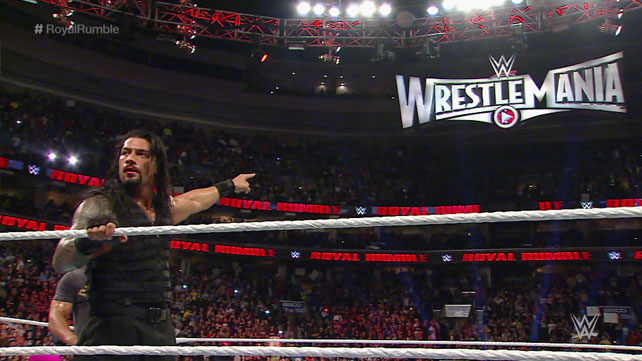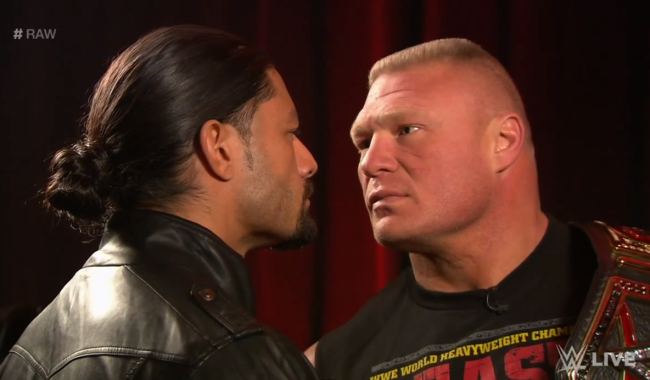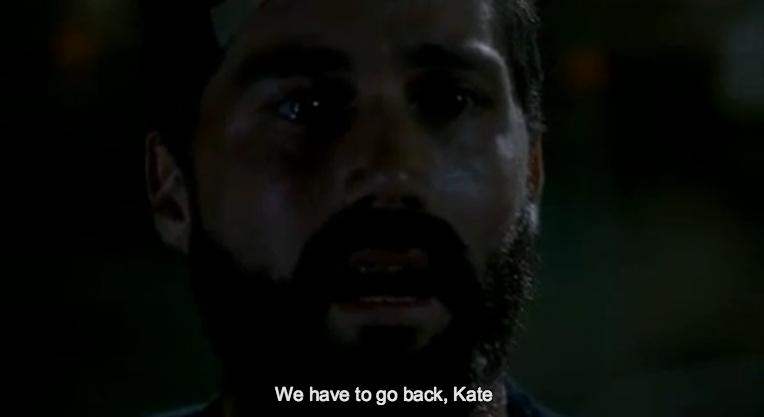Pro wrestling is a weird bastard art, and if you’re unfamiliar with its intricacies, the hordes of people in your social media circles obsessively pontificating about it every Monday night must be a truly confounding experience. Let our very own Dominic Griffin, lifelong wrestling enthusiast, teach you a little something right here, In This Very Ring…
All the way back in All-New WWE #1, I wrote about how the night after Wrestlemania is the closest thing the WWE has to a jumping on point for new viewers, but for the casual fan, it’s the few months preceding the big event that seems to bring the most eyes to the product. With the ending of this past Sunday’s Royal Rumble event, we’re officially on the road to Wrestlemania, or as some of us call it, Wrestlemania Season. If the night after ‘Mania is a brand new number one issue for newcomers to hop on, Wrestlemania itself and the two months that precede it are the big crossover event that You Must See, in theory.
You might assume that, following a typically linear storytelling structure, Wrestlemania would be a bunch of blow-off matches to feuds that have been seeded throughout the narrative cycle that began after the last Wrestlemania, but you would be wrong, because this isn’t Chikara. While that colorful indie explicitly maps out storylines in year long seasons, WWE typically flails out in various directions over the year and doesn’t actually get serious about their big finale until two PPV events prior, kind of like a season of Russell T. Davies-run Doctor Who, or a procrastinating college student cramming before finals. Even in the year preceding Wrestlemania 29, where the main event rematch of John Cena facing The Rock had been planned on the books for a whole year, they made little to no effort to foreshadow or build to this “twice in a lifetime” event until the night of the Royal Rumble.
This isn’t the worst thing in the world, but it does come with problems. One of the strangest things about the way Vince McMahon chooses to brand his empire is his insistence that he’s not in the wrestling business, but the sports entertainment business. It’s his way of telling the mainstream that he’s above the pop vulgarity of pro wrestling, and is actually competing with shows like Breaking Bad or Game of Thrones, but this is a false comparison. When it comes to combating criticism from the unfortunately labeled Internet Wrestling Community, McMahon hides behind the same carnival barker ideology wrestling promoters have always hidden behind, that the fans are just marks and don’t understand the business. They basically want to have it both ways, profiting from the weird notion that they’re just another piece of scripted programming when it suits them, then hiding under the umbrage of wrestling tradition when it doesn’t.
Put simply, WWE wants to be able to get away with some shit we would never tolerate from the primetime dramas with which they purport themselves to be in competition. If a show takes a sharp turn into a bullshit story arc, fans and critics alike will let them have it, and they have to either forge ahead with their plans, or accept that they failed and try to resolve things in the next season. A show like Alias could follow up a season that was too heavy on complex, long form mythology with one more focused on episodic adventures. If, say, a particular actor doesn’t seem to be connecting with an audience on Law & Order, Dick Wolf might just have them replaced in service of the long running procedural. Vince McMahon, conversely, is just as likely to scoff at his audience for disagreeing with his vision and go full steam ahead in spite of their objections, most of the time anyway.
Now, let’s talk about Daniel Bryan.
If you’ve been reading this column for awhile, you’re familiar with the narrative. Big babyface underdog wins world title from ace John Cena, immediately loses it under controversial circumstances and spends months clawing his way back to the top. He’s cheated out of even appearing in the Royal Rumble, making the way for part-time Superstar/Guardian of the Galaxy Batista to win and go onto Wrestlemania. That was this time last year. Fans were livid at this storyline development and booed the living fuck out of Batista. They voiced their displeasure until the powers that be did some rewriting and put Daniel Bryan back into the title picture, leading to him beating Triple H, Randy Orton, and Batista all in the same night at Wrestlemania XXX. Using wrestler promoter “you internet nerds don’t know when you’re being worked” psychology, the WWE might pretend this third act swerve was part of their plan all along, but Vince doesn’t book like 2008 era Gabe Sapolsky. He just doesn’t anticipate fan involvement in the modern era very well, so it’s highly unlikely this was their plan for Bryan all along. The fans just complained until it made more sense to let them have their way.
In this instance, it led to a great event and some great, satisfying storytelling, so following the voice of the fans was smart. Unfortunately, Bryan got severely injured and had to drop the title not long thereafter, and has been on the shelf since last summer. After baiting fans with the threat of Bryan retiring, he announced he was healthy enough to return and would be at this year’s Royal Rumble during a Raw promo. I was there that night, in the crowd, and it was a really powerful moment. For the fans, it meant their favorite wrestler wouldn’t have to cut his career short at the peak of his popularity, and for the business, it meant, hopefully, more WWE Network subscriptions to get to see Bryan enter and (maybe) win the Rumble.
This did not happen. He entered and was eliminated with little fanfare, making the way for Roman Reigns to win the title shot at ‘Mania. Now, this, in and of itself, is not a bad thing. It’s hard for Bryan fans to grasp, but him not winning doesn’t mean a bad storytelling decision is being made. The fact is, as Matt Hardy shrewdly pointed out in this video, Bryan can’t win every match and he can’t be champion forever. While the audience should continue to be vocal about who they like and don’t like, as the only voting power they have is with their voice and their dollars, there’s a limit to how much they can dictate the flow of a story, especially during that story. Fans don’t tell George R. R. Martin he has to rewrite the next Games of Thrones book just because The Red Wedding made them sad, you know? The difference is, of course, that with something like GoT, there’s a clear story being told, and you can trust the storyteller to know where he’s going. With the WWE, it’s usually a crap shoot.
In the defense of those frustrated by Bryan, Dolph Ziggler, and Cesaro not winning the Rumble, imagine what it’s like to be fans of something you’re never going to get to see succeed. I get that there are people who live in cities with shitty sports team they’ve rooted for all their lives, but the fact is, your cheering, however fervent, doesn’t have the power to make your teams play better. Wrestling is just more interactive than traditional scripted television, and there’s a general understanding that who the fans cheer and who the fans boo actually has an effect on the direction of the product.
(It’s looking like Dolph Ziggler and Daniel Bryan are going to get to tear it up together at ‘Mania, which will be great, and will more than sate any frustrations I have, but for diehard fans of these two, it’s not enough to get to see them put on great matches if, ultimately, those matches don’t move them forward in any meaningful way. To further a strained football metaphor, you wouldn’t want to keep watching your favorite team play the same team over and over for no fucking reason, no matter how exciting the play by play happens to be.)
Personally, I have no problem with Roman Reigns winning the Rumble and going to Wrestlemania to fight Brock Lesnar. The intimate and straight-laced promo the two future combatants cut with Paul Heyman on the snowed-in edition of Raw was great, and I’m personally too curious to see where things go with this angle to stop watching the show or to #CancelWWENetwork like some bitter fans. (No, seriously, how great is it that this led to an article by Time fucking Magazine?) My beef isn’t that Roman won, but that since the break-up of The Shield, he’s had nothing resembling an arc. Seth Rollins became arguably the company’s greatest heel, and Dean has, surprisingly, become a really damn good babyface, but Roman has just gone on being the dude from The Shield, but with bigger opportunities and an unhealthy amount of John Cena cosplay. Daniel Bryan’s win at Wrestlemania wasn’t great last year just because internet nerds love him from the indies, but because he had a compelling arc that led to that satisfying ending. Discounting the aforementioned Heyman promo, Roman’s had no discernible story throughout this year, so outside of some artificially manufactured momentum, there’s no investment in his journey. (Yes, all momentum in wrestling is manufactured, but Roman’s in particular fails to feel hard won.)
We celebrate good endings because we’ve invested our emotions in strong beginnings and tumultuous middle acts. More often than not, the WWE places a pin on the calendar with the happy ending they want us to cheer for, but they fail to reverse engineer a compelling narrative to take us there. They’ve shown a skill for believable course correction in the past, so one can only hope they’ll employ it this year. That doesn’t just mean shoehorning Daniel Bryan into ill-fitting angles to shut the internet up. It means putting your heroes (in this case, Roman Reigns) through a wringer so when he makes it out the other side triumphant, it means something.
Now, there is a scripted television show that did in fact mirror the WWE’s unique predicament between pushing their own agenda and pleasing a fickle, fragmented audience whose active interaction was as much boon as detriment. This show, also, was run by people who played it by ear and often seemed like they had no idea where the fuck they were going. To talk about this show, we’ve gotta go back. Way back.
LOST! A sprawling cast of disparate heroes and villains acting out grand, mythological theater? The Island might as well be a squared circle! Much like Vince and his writing team, Damon Lindelof and Carlton Cuse had a clear idea of where they wanted to take the show and what they wanted to do, but along the way, a lot of shit was up in the air and they had to improvise. A lot. Like, a lot more than you would assume given how intricate and interwoven the quilt of complimentary story arcs the show contains. Not unlike the WWE, the guys behind Lost got a lot of shit when their dramatic acrobatics didn’t gel with the expectations and hopes of their audience. They, too, had to try to cater to the average, mainstream viewer without boring their more vocal fan base, who were impatient for the show to focus squarely on their science fiction mythology. (I guess you could say Daniel Bryan is the Lost equivalent of finding out who Jacob is, while John Cena is the Kate love triangle.) The difference is that the Lost writers knew how to think on their feet and weave a metanarrative that furthered their own themes while assuaging disgruntled fans in equal measure.
(Spoilers for Lost ahead. Get the fuck over yourself, it’s been years.)
In season 2, when it was time for the writers to kill off Ana Lucia, they had to acknowledge that fans hated her character, so the heartwrenching death they had planned just wasn’t going to work the same. They solved this problem by also killing off Libby, because her burgeoning flirtation with Hurley had engendered enough fan sympathy for her passing to illicit the tragic effect they wanted. This was smart course correction. When fans bitched at the notion that the island had all these inhabitants, but we only stuck with the core cast, they introduced Nikki and Paolo, two instantly reviled characters whose mere existence set off Jar Jar Binks levels of disenfranchisement. In this instance, they had listened to the fans and tried to give them what they wanted, only to receive more scorn. They wrote the episode “Exposé” as a response to this paradox, and the result is one of the funniest, most ingenius episodes of the whole series.
You see, the WWE doesn’t need to cede to every whim of its audience. They’re a business first, and storytellers second, and neither station requires a slavish dedication to the customer always being right. If you have a product that thrives on so much fan interactivity, you have to at least consider the feedback you’re given and let it inform your storytelling, especially if you want to continue to suspend disbelief with an increasingly savvy modern audience. Lost and WWE both employed similar methods for solving these problems. The former aimed to satisfy their fans without diluting the story they set out to tell, a difficult task, but one anchored by a devotion to the very consumers whose commitment allowed the show to exist. The WWE seems to want to do its thing in spite of the people they claim to be trying to entertain.
Maybe Vince could learn a thing or two from Damon Lindelof. Just don’t let him see Prometheus.
Follow @DeadshirtDotNet and @captain_fuck on Twitter where we’ll be available to answer any possible question you could have about wrestling.





